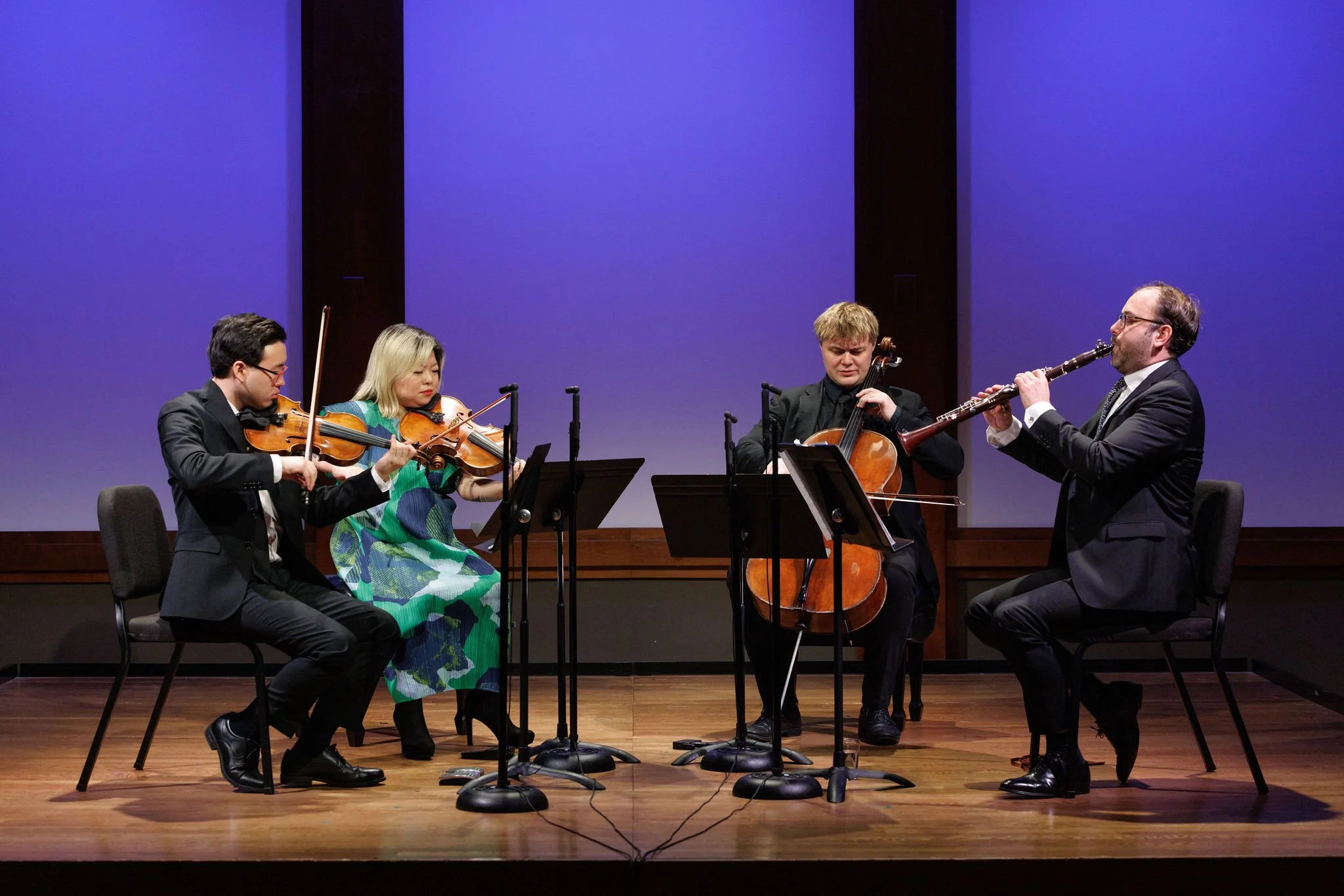REVIEW: Orion Quartet Takes a Bow
Above, Orion String Quartet in their Farewell Performance. Photo by Cherylynn Tsushima.
April 2, 2024
All the world's a stage,
And all the men and women merely Players;
They have their exits and their entrances,
And one man in his time plays many parts…
The Orion String Quartet made their exit, retiring from the concert stage after 36 years as a distinguished ensemble. Associated with Chamber Music Society of Lincoln Center for more than 30 years, their makeup unchanged for most of their tenure, this warmly received final performance was a coveted ticket on the season’s calendar.
I detected a hint of emotion from brother violinists Daniel Philips and Todd Phillips (each taking a turn on first fiddle), violist Steven Tenenbom, and cellist Timothy Eddy as they delivered their parting message. On the subject of exits — there is a certain pressure in choosing how to say goodbye. A last will and testament? Or a discreet blown kiss, and a slip out the door?
Orion’s farewell turned to two late works by Schubert and Beethoven — composed nearly contemporaneously, by two men of vastly different temperaments — two of the most probing and visionary pieces in the string quartet canon, both pieces date to the final chapter of their composers’ lives, keeping with the theme of parting thoughts.
Photo by Cherylynn Tsushima.
Franz Schubert’s String Quartet No. 15 in G Major, D. 887 begins with a soft tonic triad that instantly crescendos into a forceful minor chord; right out of the gate, this is a piece that grapples with light and dark, ambiguities, and implications. Schubert’s textures remain in a Classical vein, but he paints in harmonic colors that open the door to Romantic chromaticism and expression. Orion delivered a matter-of-fact, unhurried reading, displaying their enduring strengths as a foursome. Tight rhythmic discipline; balance; precise dynamics; insightful interpretation.
The first movement, Allegro molto moderato, an essay on shifting moral ground, asks rhetorical questions. The Orion violins’ tone colors are as complimentary as coffee and cream. Daniel Phillips, playing first in the Schubert, boasts a singing tone with a ping to the sound. Tenenbom’s viola sings, too, bringing impeccable intonation to the often thankless inner lines. Eddy’s crisp, reedy cello pops to the fore, witty in Schubert’s angular, jutting rhythms.
The remarkable slow movement, Andante un poco moto, begins with a melancholy tune in the cello, which Eddy infused with steadfastness. Subsequently, in a passage you might suspect was Dvořák, Schubert seems to be confronting the cosmos with cries of despair. Orion allowed Schubert’s existential questions to speak, with a conversational fluidity and keen listening. They played the Scherzo: Allegro vivace as if running away from a threat; when Eddy’s cello announces the soothing respite of the Trio: Allegretto, it was magical. The finale, Allegro assai, vacillates between major and minor, and continues to look to the future of harmony. Orion drove it forward like a feverish tarantella.
Ludwig van Beethoven’s Quartet in B-flat Major, Op. 130 also grapples with existential questions, especially when the harsh original finale, Grosse Fuge, Op. 133, is the conclusion, as it was tonight. (I actually prefer its replacement, a wispy Allegro, the last music he composed, but this was occasion for gravity.) Todd Phillips assumed the first chair for this probing and vibrant account of the six movement late quartet, his mellower timbre lending Orion a warmer chiaroscuro. The quartet’s nimble finger technique, especially that of Tenenbom and Eddy on the lower instruments, ensured that Beethoven’s knotty counterpoint of trills and runs was taut and biting.
The second movement, Presto, was breezy and wistful; the complex, witty third, Andante con moto, found each player contributing, and being heard, equally, in delicate ensemble playing that breathed, as if they were playing wind instruments. The Alla Danza tedesca, a distant memory of a lilting German dance, was a moment of fresh air. The Quartet took an extra beat before beginning the centerpiece of the evening, the fifth movement, Cavatina — a sublime, intimate confession. Todd Phillips’ hushed, pianissimo sotto voce in the mystical middle passage was blissful. Their Grosse Fuge also spotlighted reflective moments when the dissonant, angular torment of the main fugue subject is interrupted by sinuous rumination.
Their encore was another hearty classic — the slow movement from Mozart’s “Dissonance” Quartet, a melodic gem, with a rewarding build — the perfect send off. The Orion Quartet — whose valuable presence as quartet-in-residence at CMS and Mannes included such good works as “Beethoven 2000,” a complete cycle of the Beethoven quartets for free to the audience, and raising money for various New York City charities investing in children and music education — was awarded the CMS Award for Extraordinary Service to Chamber Music, and their legacy lives on in many fine recordings.
Photo by Cherylynn Tsushima.







